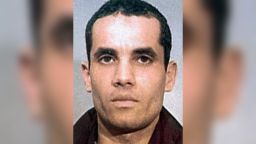Ahmed Ressam had a bomb in the spare tire well of his car when authorities arrested him in 1999. He planned to attack the Los Angeles airport.
Walid Kabbani was walking along a train track in Vermont with explosives in his bag when police intercepted him in 1987.
Both men crossed the US border – from Canada.

Experts say the decades-old cases are among a small number of examples of any terror suspects crossing a US land border. And they’re worth noting as the Trump administration amps up its push for a southern border wall by increasingly citing terror concerns.
“To the extent that there’s an issue, it is with the Canadian border. It’s a tiny, tiny, tiny issue. It’s a pre-9/11 issue. And it’s a non-issue on the Mexican border,” says CNN national security analyst Peter Bergen. “We’ve tightened up everything since 9/11, and terrorists aren’t going to Canada to get into the United States. And they’re certainly not going into Central America or Mexico.”
When it comes to talking about terrorism, Bergen says, focusing on the border doesn’t make sense. Every fatal terrorist attack on the United States since 9/11, he says, was carried out by a US citizen or legal resident.
“No one is clamoring for a wall across the Canadian border because of these events that took place two decades ago and three decades ago,” Bergen said. “The whole issue around this border discussion would make more sense if terrorism were something that’s coming from outside, but it’s something that’s here already.”

The Trump administration has zeroed in on the US-Mexico border as it makes its case for building a new border wall, repeatedly raising the specter of terrorism.
US Secretary of Homeland Security Kirstjen Nielsen said Monday that authorities at the southern US border had encountered an increasing number of people on the US terrorism watch list. “The exact number is sensitive and details about these cases are extremely sensitive,” she tweeted.
About a dozen noncitizens on the terrorism watch list were stopped at the US-Mexico border during the 2018 fiscal year, an administration official told CNN.
More non-US citizens on the watch list are encountered at the US-Canada border, an administration official said.
State Department reports on terrorism have noted more concern about Canada than Mexico.
A report released in 2017 mentioned “Canada-based violent extremists inspired by terrorist groups such as ISIS and al Qaeda and their affiliates and adherents.” That same report noted that there “are no known international terrorist organizations operating in Mexico, no evidence that any terrorist group has targeted US citizens in Mexican territory, and no credible information that any member of a terrorist group has traveled through Mexico to gain access to the United States.”
A State Department spokesperson Tuesday seemed to do an about-face, tweeting “transnational terrorists in the Western Hemisphere pose an immediate threat to Americans,” and cited DHS saying there were “terrorist encounters at the southern border in 2018.” The spokesperson then largely repeated language in the past report, tweeting the US southern border “remains vulnerable to potential terrorist transit.”
The Trump administration has also repeatedly pointed to statistics about a group known as “special interest aliens.” In a fact sheet released Monday, DHS reiterated claims that last year, the agency “encountered more than 3,000 ‘special interest aliens’” at the southern border. Nielsen touted this number last week from the Rose Garden after Trump pressed lawmakers to fund his wall proposal.
There’s no uniform definition of the term, but DHS defines “special interest aliens” as non-US persons “who, based on an analysis of travel patterns, potentially pose a national security risk to the United States or its interests.” Someone might be flagged for additional vetting because of where they’re traveling from or how they arrived in the United States.
A recent report by the Cato Institute found that no one from this group has produced a terrorist attack on US soil. From 1975 through the end of 2017, seven “special interest aliens” who initially entered the United States illegally were convicted of planning a terrorist attack on US soil, the libertarian think tank found.
“They all entered illegally from Canada or jumped ship in American ports before the list of special interest countries even existed,” the report said. “None of them successfully carried out their attacks and none illegally crossed the Mexican border.”
CNN’s Marshall Cohen, Priscilla Alvarez, Geneva Sands, David Shortell and Jeremy Diamond contributed to this report.



